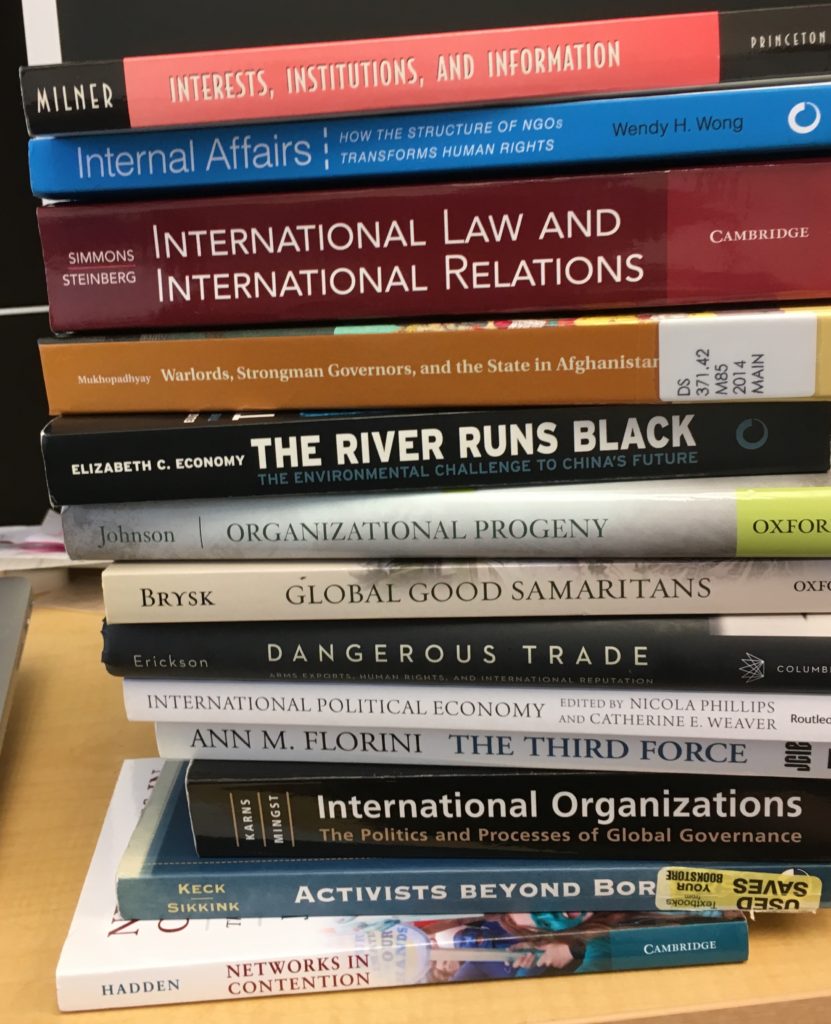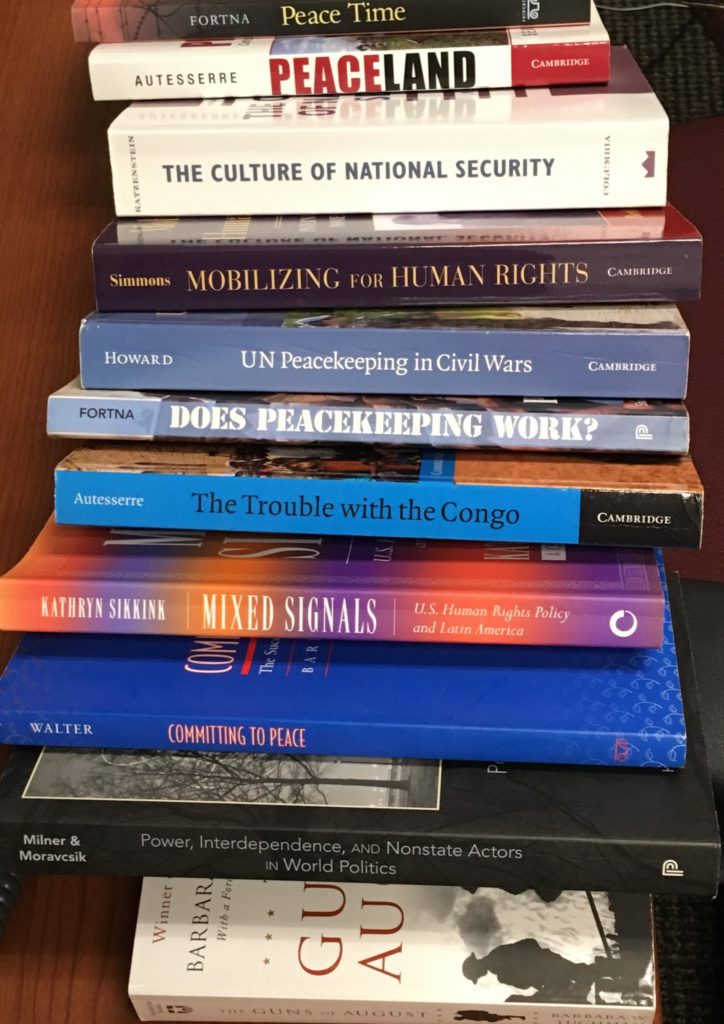This is a guest post from Anjali K. Dayal (Assistant Professor, Fordham University), Madison V. Schramm (PhD Candidate, Georgetown University), Alexandra M. Stark (PhD Candidate, Georgetown University)
The gender citation gap in international relations is an important part of today’s disciplinary conversations about diversity: research indicates that scholarship by women is less cited in academic articles; less likely to be cited by men; less likely to appear on graduate course syllabi, especially in courses with male instructors; and less likely to appear in media reports about politics. And in today’s Monkey Cage, Dawn Langan Teele and Kathleen Thelen draw on their research to demonstrate that top journals publish women at disproportionately lower rates. As scholars have made the problem more visible, editors have worked to actively correct citation bias, professors have striven to gender-balance their syllabi, and Women Also Know Stuff has built a remarkable roster of female experts for those seeking to consult a diverse group of experts.
Our focus here is on the instructional dimensions of the gender imbalance, where awareness of the problem alone cannot mitigate structural biases that leave scholarship by women and people of color less likely to be cited. This is particularly the case with introductory courses, which focus on “canonical” texts. As Robert Vitalis’ work demonstrates, what constitutes the scholarly canon itself is established by processes of contestation and marginalization endogenous to larger structures of power and representation.
Accordingly, the work of women IR scholars and practitioners, from Merze Tate and Emily Greene Balch to Susan Strange, Annette Baker Fox, Elise Boulding, and many, many others, have been systematically written out of how we teach IR and its intellectual history to young scholars—much of these scholars’ work is considered marginal to “core” contemporary international relations theory, but we ought to understand it as systematically marginalized within the canon that’s reified for generations of students, both graduate and undergraduate. Today, even the most well-intentioned instructor may be concerned that adding too many women to their syllabi will lead their students to learn less about core IR theory than a syllabus with more traditionally “canonical” texts.
This problem is amplified by the tendency of young scholars to teach as their mentors taught—reproducing theoretical narratives and ways of teaching that neglect women’s scholarly contributions in the service of teaching students what young scholars themselves know, what they have been taught to value as central and important to the discipline, and what is easy for them to teach given the nearly profession-wide imperative to privilege research over innovative course design in the early years of one’s career. Add to this the prevalence of course readers, which excerpt and reproduce canonical texts in easily-usable formats, and the tendency of some professors to make only small adjustments to syllabi over decades of teaching, and it is possible that many students’ introductions to international relations will include little to no scholarship by women and people of color at all.
As such, scholars who want to reconfigure their syllabi to be more gender representative might need additional resources to begin this process, and they may even need alternative, model visions of what constitutes a gender-equal version of introductory international relations theory.
We have created a bibliography composed entirely of articles, chapters, and books written or co-authored by women. The bibliography is organized around topics frequently taught in introduction to international relations. We are also working on a curated syllabus drawn from the bibliography in conjunction with a paper that explores how the canonical in IR became and continues to become gendered.
This work is ongoing, but we wanted to share the current bibliography as a working document as s oon as possible—particularly because we need your help. We know best what we have been exposed to ourselves, and the canon that we ourselves have been socialized into.
oon as possible—particularly because we need your help. We know best what we have been exposed to ourselves, and the canon that we ourselves have been socialized into.
We have two requests. First, we are asking you to contribute to the bibliography, and to draw on it as you find useful. Please comment below or send us an email directly with your books/chapters/or articles and we will add the citations. Second, we would love your suggestions for which texts you think ought to be included in an introductory syllabus comprised entirely of women.
Please vote in the comments below or by email. The syllabus we produce will ultimately, of course, be only one of many potential ways to address the gender gap on introductory syllabi, but our hope is that offering at least a first-cut crowd-sourced syllabus will be helpful to scholars who want to incorporate more women into their syllabi but lack easy tools to do so.
This is also a tool that journal editors and reviewers can also engage with. Two of us work as managing editors at ISQ, where reviewers are specifically directed to pay close attention to the issue of under-representation of female and minority scholars in citations and to keep this in mind “when noting overlooked authors and literatures.” Both journals and reviewers can adopt similar best practices of suggesting that authors cite more work by women scholars during the review process and by suggesting specific authors and sources. This bibliography provides a handy list of citations for this purpose.
Which scholars’ texts are taught as being foundational to the discipline reverberates through scholarship, policy, and citizenship. Including women on our international relations syllabi will help to ensure that we don’t write out successive generations of women scholars. We hope to hear from many of you what you think the best way to do this is.
Joshua Busby is a Professor in the LBJ School of Public Affairs at the University of Texas-Austin. From 2021-2023, he served as a Senior Advisor for Climate at the U.S. Department of Defense. His most recent book is States and Nature: The Effects of Climate Change on Security (Cambridge, 2023). He is also the author of Moral Movements and Foreign Policy (Cambridge, 2010) and the co-author, with Ethan Kapstein, of AIDS Drugs for All: Social Movements and Market Transformations (Cambridge, 2013). His main research interests include transnational advocacy and social movements, international security and climate change, global public health and HIV/ AIDS, energy and environmental policy, and U.S. foreign policy.



This is great! I heard from some grad students at the LSE are working on a similar/ related project, you might want to join forces…
P.S. Also check out the Global Politics: A New Introduction (Edkins & Zehfuss) textbook, lots of chapters are written by women …
Will do, thanks! Do you happen to have contact info for the LSE students?
I do – can you e-mail me?
Done!
Excellent initiative! Not currently teaching, but if/when I return to giving lectures like introduction to IR and IR theory, this will be a go-to-resource for rethinking the entire endeavour.
As for texts and authors, I would love to see more Bukovansky (2002 book is not given nearly enough credit), and I would certainly like to see Bially Mattern (book and articles) and Adler Nissen (books an articles)! Also Davis-Cross, Kuus, Lobasz, more Zarakol, more Towns, more Hansen, and, truth be told, more non-US scholars. At some point I just stopped searching for “European” women in this document.
So – a very good and necessary start, but stil work to be done. Best of luck in the endeavour!
This is great, thank you! All three of us were trained in the US and have limited exposure to work by non-US scholars but we would love to include more in the bibliography so this is very helpful.
Great work! For IR from a Global Perspective, check out the work of Arlene Tickner. She has a 2003 Millennium piece on viewing IR from the developing world, a 2003 ISP piece on Latin American IR, and a 2013 EJIR on core-periphery dynamics in IR, as well as two co-edited volumes from Routledge, “International Relations Scholarship around the World” (2009) and “Thinking International Relations Differently” (2013). Christine Ingebritsen, Sieglinde Gstohl, and Iver Neumann also have an edited volume “Small States in International Relations” (University of Washington Press, 2006). For the Rise of China section, Deborah Brautigam has done excellent work on China’s efforts to establish trade and influence in Africa. Good luck moving the project forward!
Will do, thank you!
Wonderful initiative! Off the top of my head: on political economy, Jacqui True, Political Economy of Violence against Women; on theory, Lauren Wilcox, Bodies of Violence; on theory or historical IR, Patricia Owens, Economy of Force; and a good compilation of fem security studies published in Security Dialogue can be found here: https://journals.sagepub.com/page/sdi/collections/virtual-collections/feminist-security-studies-revisited (curated by Annick and Maria Stern). All of these titles are not just women-authored, but specifically feminist in approach and orientation. Also on methodologies, Ackerly, Stern and True on Feminist Methodologies is really good.
It looks like Cohn’s “Sex and Death…” is not here and that would be a great addition to the section on nuclear weapons. Valerie Hudson’s more recent co-authored pieces on gender equality and foreign policy incl. “The Hillary Doctrine” would also make good additions to the foreign policy section.
More broadly, the FTGS section of ISA also maintains a research blog with lots of articles authored/co-authored by women: https://ftgsresearch.blogspot.com. Good luck!
Kelly Greenhill, “Weapons of Mass Migration,” book or https://calhoun.nps.edu/bitstream/handle/10945/11515/SI_V9_I1_2010_Greenhill_116.pdf
Surprised/dismayed Jennifer Mitzen was not included in this bibliography!
Some others to consider:
Beate Jahn (e.g., “Theorizing the Political Relevance of IR Theory,” ISQ, 2016)
Cécile Fabre (Cosmopolitan War)
Wendy Brown (Walled States, Waning Sovereignty)
Jennifer Lind (Sorry States)
Janice Thomson (Mercenaries, Pirates, and Sovereigns)
J.B. Elshtain (Women and War)
And a few other names, in no particular order: Cynthia Weber, Ann Hironaka, Elizabeth Cobbs Hoffman, Cornelia Navari, Miranda Schreurs, Elizabeth Kier, Beatrice Heuser, Béatrice Hibou, Jutta Weldes
Thanks everyone!! We are slowly but surely going through your comments and adding all of your wonderful suggestions.
On Transitional Justice
Lauren Balasco, The Transitions of Transitional Justice: Mapping the Waves From Promise to Practice, Journal of Human Rights, Volume 12, 2013 – Issue 2.
https://stockton.academia.edu/LaurenBalasco/Publications
Alana Tiemessen – https://alanatiemessen.com/research/
Tremendous resource, some names from my endnote would be…
For humanitarian intervention, Responsibility to Protect, UNSC and peacekeeping
Kirstin Ainley, Louise Arbour, Jennifer Welsh, Cristina Stefan (formerly Badescu), Jess Gifkins, Trudy Fraser, Catherine Jones, Sara E Davies, Sarah Teitt, Andrea Birdsall, Chiara De Franco, Annemarie Peen Rodt, Cecilia Jacob, Theresa Reinold, Sarah Brockmeier, Monica Serrano, Noha Shawki, Anastasia Shesterinina, Karen E. Smith,
Norms
Antje Wiener